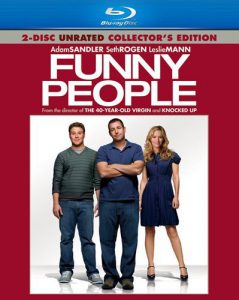If you saw any of Comedy Central’s advance coverage of “Funny People,” you’ve seen most of the funny bits of the new Judd Apatow movie. But one thing you didn’t get from the previews was the fact that Adam Sandler’s character, George Simmons, is a not-so-great-guy.
Although both Sandler and George Simmons are comedians with a juvenile style of humor, this is by no means Sandler playing himself (confusing the issue is the use of Sandler’s crank-call videos to show George’s background). George is rich, spoiled and vaguely rude; Sandler might be rich, but I can’t imagine him living in a mansion and being chauffeured around in a limo like George.
George is unhappy because he never sealed the deal with the love of his life, Laura (played by Leslie Mann, a veteran of Apatow’s films; she’s his wife, but also a good actress — witness the scene where she tells George she has always loved him). And also, George has no genuine friends. (Sandler, by contrast, is good buddies with Apatow.)
But George comes off as more pathetic than sympathetic, because he has brought his lack of friends on himself. Sure, some people use him. Jason Schwartzman and Jonah Hill play those characters — the types who want to get ahead in the comedy world, even if it means selling out to a crap sitcom like “Yo, Teach.” But Ira, the subtlest character Seth Rogen has played in his winning career, isn’t using George. Ira is an easy guy to get along with, but more than once George tells him, “You’re my employee, not my friend.”
Romantically, the main relationship is between George and Laura. I would’ve liked more of the secondary relationship between Ira and a cute, extremely dry comedienne named Daisy (Aubrey Plaza). They’d make a perfect match, but she’s a bit hard to know, and he’s a bit awkward.
Like all Apatow films, “Funny People” is long (the cancer-scare plot is over by the time the romances really kick into gear), but that extra time gives it extra depth. Consider the scene where George — being attacked by Laura’s raging husband (Eric Bana) — says, “I don’t know how to fight; I’m a comedian!” It’d be a cheap laugh in a lesser film, but it’s part of an intense sequence here.
The themes — loneliness, friendship, communication — are nothing new, but I wasn’t bored. “Funny People” doesn’t exactly twist and turn plot-wise, yet I never felt like I knew how it was all going to turn out.
It’s not Apatow’s outright funniest film, although you will chuckle now and then. The vibe is kind of like “Mr. Saturday Night” — more of a downer than the material might suggest. If you’re looking for writing about writers, art about artists, comedy about comedians, you might be disappointed to find “Funny People” isn’t about the comedy field, it’s about the people in the field. There’s a nice final scene of George and Ira throwing around premises, and it kind of made me wish it were that kind of movie.

Instead, “Funny People” is a relationship and friendship movie; everything else is window dressing. Still, it’s Apatow being Apatow, and I wouldn’t want anything else. Like all of his work, it’s an engrossing story about confused, likable people awkwardly grasping at happiness.

